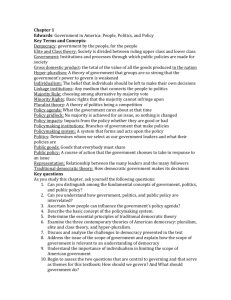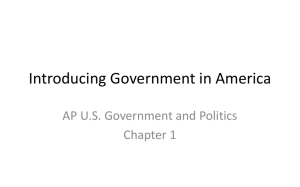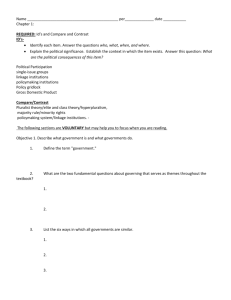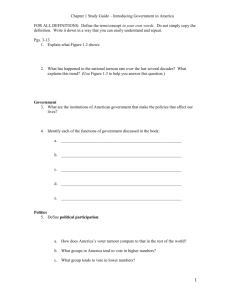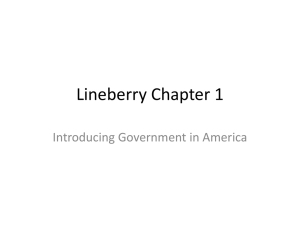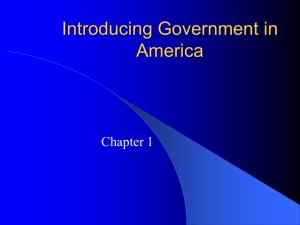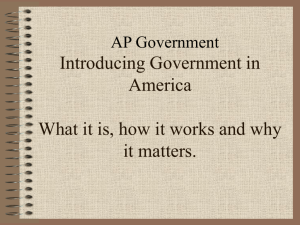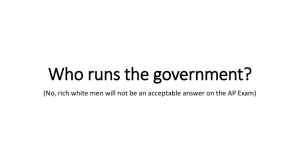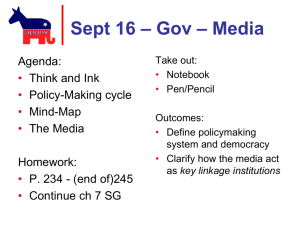US GovernmentNotesChapter 1 AP US Gov Notes --
advertisement
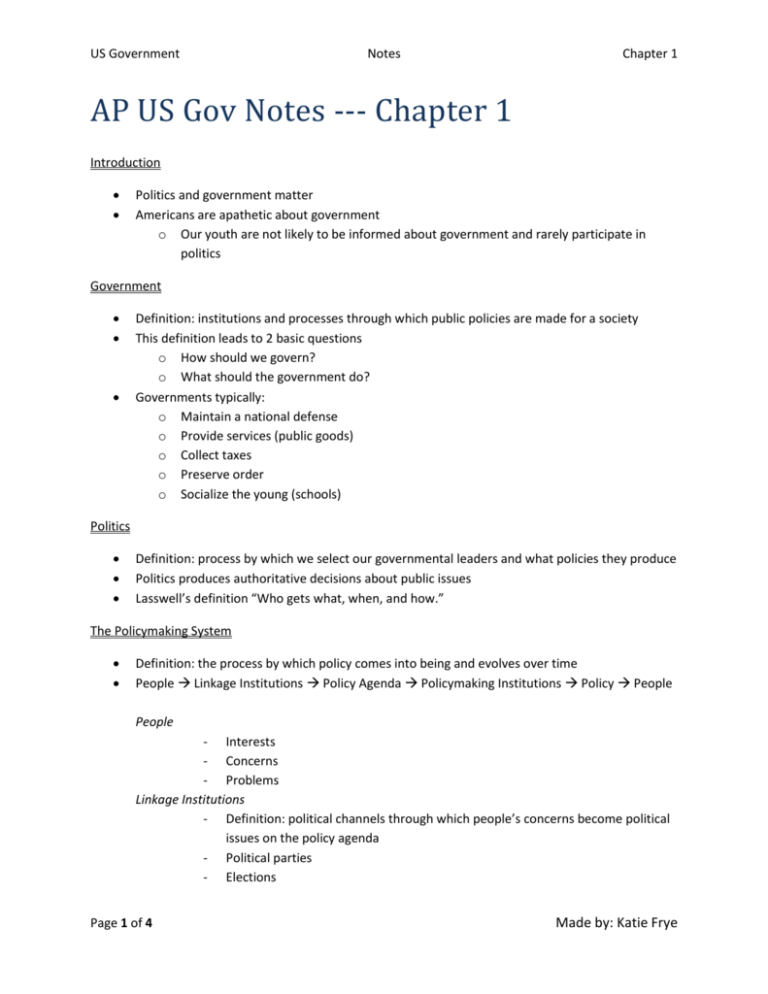
US Government Notes Chapter 1 AP US Gov Notes --- Chapter 1 Introduction Politics and government matter Americans are apathetic about government o Our youth are not likely to be informed about government and rarely participate in politics Government Definition: institutions and processes through which public policies are made for a society This definition leads to 2 basic questions o How should we govern? o What should the government do? Governments typically: o Maintain a national defense o Provide services (public goods) o Collect taxes o Preserve order o Socialize the young (schools) Politics Definition: process by which we select our governmental leaders and what policies they produce Politics produces authoritative decisions about public issues Lasswell’s definition “Who gets what, when, and how.” The Policymaking System Definition: the process by which policy comes into being and evolves over time People Linkage Institutions Policy Agenda Policymaking Institutions Policy People People - Interests - Concerns - Problems Linkage Institutions - Definition: political channels through which people’s concerns become political issues on the policy agenda - Political parties - Elections Page 1 of 4 Made by: Katie Frye US Government Notes Chapter 1 - News and entertainment media - Interest groups Policy Agenda - Definition: issues that attract the serious attention of public officials - Political issues arise when people disagree about a problem and how to fix it - Some issues will be considered, and others will not - A government’s policy agenda changes regularly Policymaking Institutions - Definition: Policymaking institutions are the branches of governments charges with taking action on political issues - Legislature (Congress) - Executive (President) - Courts (Federal and State) - Bureaucracies (Federal and State) Policies Impact People - Public Policy: a choice that government makes in response to a political issue - Impacts of policies: Does it solve the problem? Does it create more problems? - Depending on the answer, policy impacts carry the political system back to its point of origin: the concerns of the people Democracy Definition: system of selecting policymaking and of organizing government so that policy represents and responds to the public’s preferences Components of Traditional Democratic Theory o Equality in voting o Effective participation o Enlightened understanding o Citizen control of the agenda o Inclusion Majority Rules: in a democracy, choosing among alternatives requires that the majorities desire be respected Minority Rights: guarantees rights to those who do not belong to a majority Theories of US Democracy Pluralist Theory - Theory that politics is mainly a competition between groups, each one pressing for its own preferred policies - Groups will work together - Public interest will prevail through bargaining and compromise Page 2 of 4 Made by: Katie Frye US Government Notes Chapter 1 Elite and Class Theory - Theory contending that societies are divided along class lines and that an upperclass elite will rule, regardless of the formal niceties of governmental organization - Not all groups are equal - Policies benefit those with the most $ and power Hyperpluralism - Theory contending that groups are so strong that government is weakened - Groups control policy and prevent the government from acting - Difficulty in coordinating policy implementation - Confusing and contradictory policies result from politicians trying to placate every group Challenges to Democracy Increased technical expertise - Experts with their technical knowledge overshadow the knowledge of the general population Limited participation in government - Americans care little about politics Escalating campaign costs - Political Action Committees (PACs) fund some campaigns - PACs care only about what they want, so politicians will listen to them lest they be denied reelection $ Diverse political interests (policy gridlock) - Too many groups and people want policies for their issues - May conflict Resulting in a Policy Gridlock – little gets done American Political Culture and Democracy Political Culture: an overall set of values widely shared within a society Fundamental values of democracy: Liberty - Freedoms of speech and religion Egalitarianism - Page 3 of 4 Involves equality of opportunity Americans have never been equal Everyone has a CHANCE to be rich – not everyone WILL be rich Made by: Katie Frye US Government Notes Chapter 1 Individualism - Belief that people can, and should, get ahead on their own Laissez-Faire - Promote free markets and limited government In terms of the American government’s impact on citizen’s everyday lives, it has done less than governments of other nations Other nations’ governments are responsible for airline, telephone companies, healthcare, and building homes - Political philosophy supporting the rights of average citizens in their struggle against privileged elites Populism Page 4 of 4 Made by: Katie Frye

